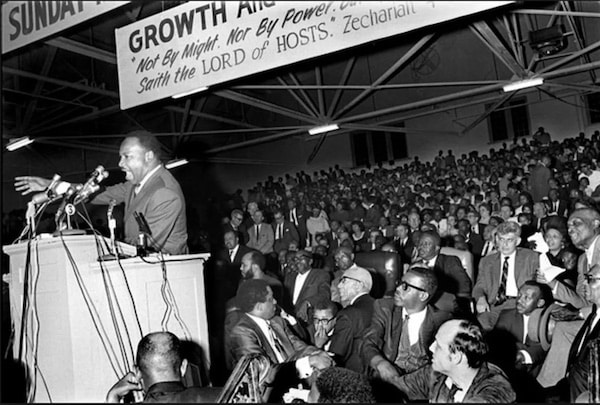Again we have deluded ourselves into believing the myth that capitalism grew and prospered out of the Protestant ethic of hard work and sacrifices. Capitalism was built on the exploitation of black slaves and continues to thrive on the exploitation of the poor, both black and white, both here and abroad.
— MLK The Three Evils speech, 1967
I often think about how one of the most revolutionary black men in history can be completely altered; completely reconstructed; undergoing a kind of magical jolly negro transmorgification? The legacy of King has been completely reconstructed to fit the pernicious fantasies of liberals whose only aim is to use King’s image as a tool to ensure Black people remain servants of their own oppression; to insidiously, use King’s image in order to deploy the stifling hegemonic ideas of the ruling class. But the vile disfigurement of King’s legacy, as well as, his and the Civil Rights Movement’s undeniable Marxist foundations will no longer be erased!
Martin Luther King was a student of Hegel. He “followed in the dialectical tradition” as so critically and unrelentingly pointed out in Andrew J. Douglas and Jared A. Loggins book Prophet of Discontent: Martin Luther King Jr. and the Critique of Racial Capitalism.
King interrogated and deeply analyzed the economic structures of capital as it relates to the social conditions of people; and the Hegelian influence is pervasive and undeniable— I would also argue, there are possible notes of a Kantian influence on Dr. King as well. In his 1952 letter to then girlfriend Coretta Scott King, MLK wrote in discussing Edward Bellamy’s seminal socialist novel Looking Backward that, “I imagine you already know that I am much more socialistic in my economic theory than capitalistic”. (Paul Le Blanc, Christian Core, Socialist Bedrock) Before King wrote this letter to Coretta outlining his socialist ideas, he “attended Crozer Theological Seminary in Chester Pennsylvania from 1948 to 1951″(Le Blanc) where he rigorously studied Capital and the Communist Manifesto. Even his teacher and confidant, as Le Blanc points out in his essay, at the seminary Rev. J.Pious Barbour stated that King “analyzed the economic side of capitalism right”; and that King himself believed that seared into the veins of capital was a “system predicated on exploitation, prejudice and poverty, and that we wouldn’t solve these problems until we got a new social order”.
Conversely, not only has there been a wholesale blotting out of MLK’s communistic ideological base, but there has been a total deletion of communism as the theoretical and organizational substrate of the Civil Rights Movement. When we speak of people like the prominent A. Phillip Randolph “whose political career began as a Socialist Party member and who published a radical magazine The Messenger”, as well as being foundational in labor organizing in this country; or Bayard Rustin who was in the Communist Party USA in the late 1930s and was admired by revolutionary forefather Kwame Ture; or when we speak of the Southern Christian Leadership Conference (SCLC) The Brotherhood of Sleeping Car Porters, or seminal figures such as E.D Nixon and Stanley Levison we must—in fact— we owe it to them, to speak of Marxism-Leninism. The March on Washington Movement, the Montgomery Bus Boycott, the Poor People’s Campaign, all at their very substratum, had a rooted Marxist understanding.
In essence, the history of the Civil Rights Movements is a Black Marxist one. The cooptation of King’s image for the purposes of the neoliberal hegemon is all too evident. When you take a people’s leaders and contort them into something unrecognizable you’re also able to alter their own self perception; and, in turn, disintegrate their ability to discern what oppression is, as well as, what’s needed ideologically and materially to destroy it. Hence, the disfiguring of Martin Luther King’s image is also an ontological question for Black people collectively. What happens to a people when they exist only in the blurred disfiguration of their revolutionary leaders?
Our collective intervention, therefore, must be to remove the plaster of color blind, class blind “unity” and all the other deadened bourgeois, Black capitalist-aspirationalist lacquer they’ve put atop of King’s image. We must study, learn and re-educate our people of the revolutionary history of King and put a permanent end to the liberal “Teddybear-ification” of Dr King’s legacy. In short, when we talk about H-rap Brown, when we talk about Fred Hampton, when we talk about Malcom X, when we talk about Harry Haywood, we are talking about Martin Luther King.

